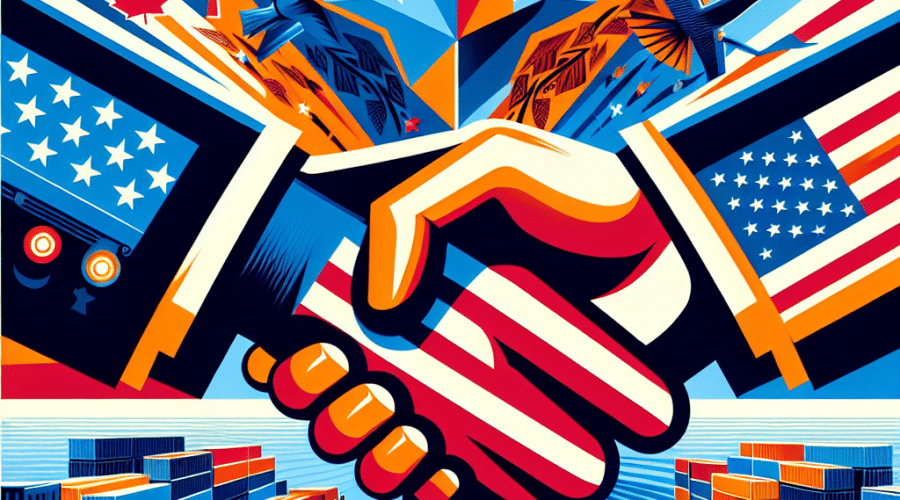The United Arab Emirates (UAE) has pledged up to $50 billion in investments into Canada in a landmark move set to redefine economic relations between the two nations. This historic agreement, reached during Canadian Prime Minister Mark Carney’s official visit to the UAE—the first by a Canadian prime minister in over four decades—signals a new era of economic collaboration targeting key sectors such as artificial intelligence (AI), energy, mining, and more. The timing and breadth of this partnership underscore both countries’ ambitions to become global leaders in emerging technology and sustainable industries.
A New Chapter in Canada-UAE Relations
The $50 billion commitment marks an unprecedented step in strengthening bilateral economic ties. Prime Minister Carney’s trip to the UAE aimed not just to foster closer diplomatic relations but to catalyze a wave of foreign direct investment that will accelerate Canada’s growth ambitions. Following the visit, the UAE Ministry of Investment formally announced the intent to channel these investments into the Canadian landscape, encompassing high-growth and strategic sectors.
The historic nature of the trip is underscored by the more than 40-year gap since a Canadian head of government last visited the UAE, reflecting a significant reset and revitalization of ties. Behind the scenes, Carney has expressed a strategic priority to diversify Canada’s economic dependencies, particularly shifting focus beyond its traditional export partner, the United States. Attracting foreign capital has become a core tenet of Carney’s economic policy, positioning Canada as a welcoming and high-potential investment destination for sovereign wealth funds and multinational investors alike.
Landmark Investment Agreements: FIPA and CEPA
Prime Minister Carney and UAE President Sheikh Mohamed bin Zayed Al Nahyan formalized their partnership by signing a Foreign Investment Promotion and Protection Agreement (FIPA). This agreement is designed to provide clarity, legal certainty, and reduced regulatory burden for Emirati investors seeking opportunities in Canada. With an emphasis on long-term collaboration, FIPA removes investment uncertainties, making it easier and more attractive for UAE capital to flow into Canadian infrastructure, technology, and resource sectors.
Carney reinforced the significance of the agreement, stating that these measures would “attract billions of dollars in investments into Canada”—a claim well substantiated by the scale and expertise the UAE brings to global investment markets. The FIPA provides a rules-based framework that will boost investor confidence and support projects in diversified segments—including engineering, clean tech, AI, and data infrastructure.
Simultaneous to the FIPA signing, negotiations commenced on a Comprehensive Economic Partnership Agreement (CEPA). If realized, the CEPA would systematically reduce tariffs, streamline regulatory frameworks, and eliminate other trade barriers. Such a framework has the potential to double bilateral trade from its current annual volume of $3.4 billion to $7 billion within the next decade, based on the performance of similar Canadian agreements with countries like South Korea and Chile.
Strategic Sectors: AI, Energy, and Mining
The UAE’s $700 billion economy boasts diversified expertise and is backed by robust sovereign wealth funds, making it an ideal partner for Canada’s ambitions in advanced technologies and sustainable resource development. The focus investments will be directed at multiple target industries:
- Artificial Intelligence: Canada and the UAE are punctuating their partnership with a keen focus on AI research and deployment. Collaboration between Canada’s renowned Mila AI research institute and the UAE’s Technology Innovation Institute is set to accelerate breakthroughs in machine learning, data analytics, and next-generation intelligent systems. Furthermore, Canadian officials and business leaders are engaging with G42, a leading Emirati AI firm, to identify joint ventures and technology transfer opportunities.
- Energy and Clean Technologies: One of the partnership’s hallmarks is the prioritization of clean energy solutions and advanced energy infrastructure. This includes investments in renewables, energy storage, carbon capture, and green hydrogen facilities. The UAE is leveraging its expertise in sustainable development—exemplified by initiatives such as Masdar City—while Canada brings world-class research and natural resources to the collaboration.
- Mining and Resource Development: As Canada looks to bolster responsible mining and critical minerals production, the UAE’s investments will support new exploration, sustainable extraction practices, and the deployment of smart mining solutions.
Canada’s Export Ambitions: Diversifying Beyond the U.S.
Canada’s trade portfolio has historically leaned heavily on the United States, but shifting global dynamics and new opportunities have prompted a strategic pivot. The UAE, positioned as a vital logistics and commercial hub at the crossroads of Asia, Europe, and Africa, represents a gateway for Canadian products to diverse new markets.
In particular, aerospace components, agri-food products, and seafood have emerged as high-potential export categories. The UAE’s advanced logistics infrastructure, including world-class port facilities and free zones, will make it easier for Canadian exporters to access global supply chains. The two countries envision a significant increase in bilateral trade and reciprocal investments, setting ambitious targets for growth in the coming years.
Leadership Engagement and Business Collaboration
During his official state visit, Prime Minister Carney prioritized engagement with top executives and thought leaders in the UAE’s technology and business sectors. Of particular note was his meeting with leadership from G42, a cutting-edge Emirati AI company with global ambitions. Discussions centered on opportunities to co-develop products, foster talent exchange, and jointly advance capabilities in AI and data-driven innovation.
Supporting these high-level discussions, Canada’s Minister of International Trade, Maninder Sidhu, has announced plans to lead a major business delegation to the UAE in 2026. This mission will focus on cementing opportunities across AI, digital infrastructure, and clean energy, while enabling Canadian companies to secure strategic partnerships and joint ventures with UAE counterparts.
Strengthening Innovation and Security Partnerships
The Canada-UAE partnership is not limited to investment and trade; it aims to foster groundbreaking scientific innovation and digital trust. As part of the new agreements:
- AI Research Partnerships: The collaboration between Mila and the UAE’s Technology Innovation Institute heralds a new phase in North-South technological diplomacy, fusing expertise in deep learning, robotics, and ethical AI development.
- Cybersecurity Initiatives: Canadian cybersecurity leader BlackBerry has joined forces with the UAE’s Cyber Security Council to enhance cyber threat intelligence, incident response, and digital resilience across critical infrastructure sectors in both countries.
These partnerships reflect both nations’ commitments to future-proof their economies and societies, build global leadership positions in trusted technologies, and secure digital assets in a fast-changing world.
Forecasting Economic Impact and Market Opportunities
Experts predict significant economic benefits for both Canada and the UAE. As these agreements mature, billions of dollars in Emirati investment capital could flow into Canada’s infrastructure, advanced manufacturing, healthcare technology, and digital innovation ecosystems. In return, UAE companies will gain privileged access to Canadian research, resources, and markets—opening avenues for co-development and joint commercialization of new products and services.
The broader economic impact will include job creation, enhanced research and development, increased trade volumes, and an elevation of both countries’ profiles as leaders in the green and digital economies. For Canadian businesses and entrepreneurs, the agreement provides clarity, market certainty, and new routes to scale up globally. For Emirati partners, it delivers security of investment, regulatory transparency, and access to Canada’s highly skilled workforce and innovation ecosystems.
Looking Ahead: Long-Term Vision and Collaboration
As negotiations continue on the Comprehensive Economic Partnership Agreement (CEPA), both governments are optimistic about achieving a full-spectrum economic integration. The long-term vision extends beyond transactions; it is about building enduring partnerships that can drive sustainable growth, address global challenges like climate change and cybersecurity, and foster a culture of innovation across continents.
Prime Minister Carney and President bin Zayed have both signaled their commitment to overseeing the implementation and periodic review of these agreements, ensuring that the benefits are shared broadly across industries and regions within both countries.
Conclusion: A Strategic Partnership for the Future
The Canada-UAE investment and trade agreements represent a pivotal moment for both nations, positioning them at the forefront of global trends in technology, clean energy, and economic resilience. By forging deeper partnerships, establishing robust frameworks for investment protection, and facilitating trade flows, Canada and the UAE are not only enhancing their own prosperity but are also setting an example for cross-border collaboration in an increasingly complex world.
As the agreements are rolled out and new joint ventures commence, the world will be watching to see how this ambitious alliance reshapes markets, creates jobs, and establishes new paradigms for responsible and forward-looking global commerce.


















